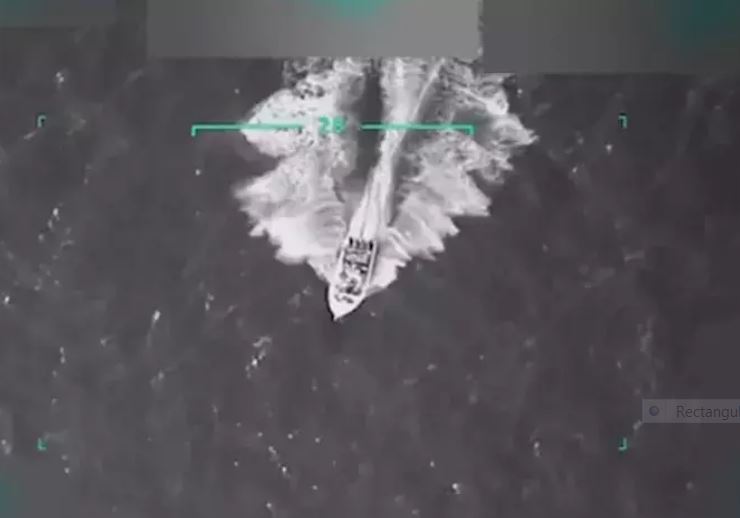The political currents in the Caribbean are growing increasingly turbulent, with recent events suggesting a dangerous escalation in the long-standing animosity between the United States and Venezuela. While official Washington continues to deny the legitimacy of President Nicolas Maduro, recent actions on both sides indicate a complex and often contradictory reality.
Just this week, an incident on the high seas sent shockwaves through the region. A Venezuelan vessel, allegedly carrying eleven individuals, was reportedly engaged by the U.S. Navy. The official narrative from the Trump administration claims the vessel was involved in drug trafficking, a line that many observers are openly questioning. A former head of drug interdiction for the U.S. Department of Justice, speaking to the New York Times, pointed out several inconsistencies: the purported drug organization, Tren de Aragua, has no known history of fentanyl trafficking, and drug operations rarely involve such a large crew. The chilling possibility, raised by the former official, is that the boat may have been carrying desperate individuals seeking passage to another country, who were then summarily killed without due process.
This incident immediately draws parallels to past U.S. military actions, such as the widely criticized drone strike in Yemen that the Trump administration initially claimed targeted terrorists, only for it to later emerge that the victims were likely attending a wedding. The lack of identification for the eleven deceased on the Venezuelan vessel, and the absence of any presented evidence confirming their alleged illicit activities, fuels concerns that this latest act is more about a public show of force than genuine drug interdiction.
At the heart of this complex dynamic is the United States’ persistent refusal to officially recognize Nicolas Maduro as Venezuela’s legitimate president. For over five years, Washington has instead supported a revolving door of opposition figures, from Juan Guaidó (now a grad student in Miami) to Edmundo González (reportedly in Spain), and most recently, María Corina Machado. The latter, it has been noted, has been a long-time recipient of USAID funding, allegedly aimed at destabilizing the Venezuelan government since the “revolution” that moved the country away from foreign and neoliberal rule.
However, the U.S.’s actions often contradict its official stance. Earlier this year, Trump’s special envoy, Richard Grinnell, traveled to Venezuela for direct talks with Maduro himself. The meeting, held in the presidential palace under a display of both American and Venezuelan flags, resulted in the release of U.S. prisoners and a deal for monthly flights returning Venezuelan migrants from the U.S. back to their home country. These negotiations, conducted directly with the Maduro government, underscore the undeniable reality of his control over the nation’s institutions, military, and borders.
Many analysts point to Senator Marco Rubio, now serving as Trump’s National Security Advisor, as a key driver of the aggressive stance against Venezuela. Rubio, long considered a neoconservative hawk, is seen as prioritizing the interests of the Cuban and Venezuelan expat community in Florida over what might be considered an “America First” foreign policy. This expat community, a powerful political force in Florida, advocates for a hardline approach, even at the expense of U.S. economic interests.
Venezuela, with the world’s largest oil reserves, presents a stark example of this ideological disconnect. Despite historical reliance on Venezuelan oil (it fueled U.S. efforts in World War II), sanctions imposed by Washington have cut off this vital, geographically convenient supply, contributing to higher gas prices in the U.S. While China and Iran are now actively assisting Venezuela in recuperating its oil production capacity, the U.S. continues to demonize the socialist nation, pushing for its weakening rather than seeking mutually beneficial relations.
The “drug kingpin” indictment against Maduro and the unprecedented $50 million bounty on his head are viewed by many as further ideological attacks, especially given the widely available UN statistics showing that Venezuela is not a top producer or primary transit route for cocaine. Instead, countries like Ecuador and Honduras, which have historically enjoyed close U.S. alliances, have presidents or influential families with documented ties to drug trafficking.
Perhaps the most troubling revelation concerns the fate of CITGO Petroleum, a U.S.-based subsidiary of Venezuela’s state oil company. Following the U.S.’s recognition of a “shadow government,” all Venezuelan state assets were seized, including its sovereign gold supply and, eventually, CITGO. U.S. courts are now poised to sell off CITGO to the highest bidder, and the likely buyer is none other than Paul Singer of Elliott Capital Management – a leading hedge funder and billionaire who has been a major financial backer of Marco Rubio.
This “corporate coup,” as some are calling it, highlights a disturbing pattern where U.S. foreign policy appears to be driven by the financial interests of political donors. As Venezuela strengthens its ties with a rising multipolar world, including China and Russia (both of whom have significant investments and even a military presence in the strategically located, resource-rich nation), the U.S. risks a dangerous confrontation that could have devastating consequences for the entire hemisphere.
The recent comments from Secretary of Defense Pete Hegseth, stating readiness for “whatever military action the president wants to take,” raise alarms about the potential for a U.S. invasion on the American continent. Critics argue that such a move, driven by ideological fervor and political expediency rather than strategic national interest, would unleash unimaginable instability, far exceeding the fallout from past conflicts in the Middle East.
As the “Liberty Lounge” in Caracas continues to witness quiet conversations and the global chess game unfolds, the question remains: will the U.S. continue down a path of confrontation driven by narrow interests, or will it seek a more cooperative approach with Venezuela and the broader Latin American region? The answer could profoundly shape the future of the Western Hemisphere.
